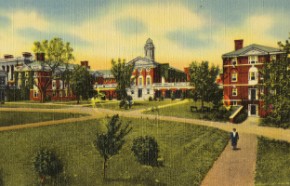
I am standing in the woods and smashing eggs against my forehead.
Some of them are hard-boiled: a little painful on impact, but not so bad. But some are raw, and they make a riotous mess, yolk exploding through my hair and running down my cheekbones. I am stickier than I was when I practiced this at home. Now I’m no longer practicing but in competition: my opponent and I are taking turns, choosing our eggs from a shared dozen. The first one with two raw eggs on the face loses. The crowd wins either way.
This crowd deserves a win. We stole the egg bit in its entirety from Jimmy Fallon, whose arsenal of goofy celebrity games includes the cathartic sight of Tom Cruise smashing eggs against his face. But we stole it for a good cause. We’re in the woods at Sweet Briar College, a month after the announcement of the Virginia school’s impending closure. When the semester ends, these students will lose their collegiate home. Shortly thereafter, the faculty and staff will lose their jobs. Hopefully the game provides some catharsis for them, too.
Read our latest issue or browse back issues.
But I’m no Tom Cruise. I’m just the chaplain, and very new on the scene. The day of the announcement was my fourth day on campus—as temporary, part-time help. I didn’t know where to park my car or how to make the printer work. I certainly didn’t know all the people for whom I was called to care.
I did know that the whole student body had been summoned to the auditorium—and I was one of a few people who knew why. All morning long I’d known what was coming, much as I would have liked to stay in the dark. I got a tip the day before that Sweet Briar’s board had determined the college’s financial challenges to be insurmountable. I knew the board had voted to close the school, effective at the end of the semester. I knew that the students and staff whose names I was just learning were on the brink of having their world torn apart. And I knew that I was the chaplain, and that I was going to have to watch it happen.
During lunchtime, while the president delivered the fatal news to the faculty and staff, I attended the regular meeting of students working for the Office of Spiritual Life. My secret charge was to gather as many as possible into the auditorium for the chance to hear the news directly from the president, before it hit Twitter with explosive force. But as we walked up the hill to the auditorium, my phone was already lighting up. A friend at a nearby college forwarded her own faculty announcement: “Is this for real? What’s going on out there?” I responded with brevity bordering on hostility, typing as I walked: “Students don’t know yet. We need ten minutes. Stay off Facebook.”
The assembly was brutal. I sat with a few friendly students but could hardly engage, knowing what I knew and they didn’t. I stared at my phone, waiting for social media to beat the president to his own job. The sound system wasn’t working, and we waited for an eternity of troubleshooting. And then there was no more time, and the president came out and spoke without a mic, projecting his voice. He said he wanted to get right to the point. He said it broke his heart to be there. Then he said Sweet Briar would close its doors. The class of 2015 would be the last graduating class.
And then the whole auditorium burst into tears.
Some were tears of panic: Where will I go? Who will take me in? What about all the plans I made? In the chaplain’s office, in the days and weeks that followed, this was how we started our conversations. All I had to say was “So, what are you thinking?” and everyone understood what I meant: What’s next? What schools are you talking to? Where have you visited? What have you done to navigate all the practical hurdles that emerge when your college spontaneously combusts?
But some of those tears were something else. They were something more suffocating, more plaintive—something indicative of the collective loss that descended like a shroud over campus. Sweet Briar is a unique place. Camouflaged against the backwoods of the Blue Ridge mountains, hidden around a quiet corner from an already quiet town, the campus is a hard place to find. But those who do find it so often find themselves as well, which makes Sweet Briar an even harder place to lose. No, the loss of one small college will not register on the scale of great human tragedies. Yet for those whose lives had been made and molded on this campus, those tears were something like a deep wail of grief.
For the first few days, students streamed into my office, and all I could do was listen. Once that stream died down, life on campus began to look normal, at least on the surface. Students went to class (mostly). They came to activities (sometimes). The public life of the campus resumed—but in private the cost was staggering. It was paid in student friendships torn apart by the pressure of choosing futures together, in faculty and staff relationships divided across battle lines drawn in the campus sand. It was paid in emergency antidepressants, sleepless weeks and months, and uncountable emotional toil. It was paid in a dozen crises that came across my door and hundreds more that never made the trip.
The pain and anger seemed to sink into the land itself—which, of course, is why I later found myself smashing eggs against my forehead. Better to let it out one yolk at a time, I suppose. It turns out I really don’t know what to do when a college collapses. But if it helps, I’m willing to stand around with egg on my face.
Fortunately, while I was fighting trauma with poultry, others brought more sophisticated tools. Shortly after the announcement, alumnae began to organize. The resulting #SaveSweetBriar movement proved to be fit for the moment at hand. After months of litigation and discord, on June 20 the Virginia attorney general announced a mediated plan to keep Sweet Briar open—for one more year, anyway. The school’s long-term future remains a point of great local speculation. But on that night, the mood was deep and unadulterated joy.
A few weeks prior, a student rose during Sunday worship to offer her prayer: “I haven’t always thought much of hope. I always thought it was a kind of empty, fluffy thing.” She paused, choking back tears. “But now I know what hope means.” Hope means that the story’s not quite over, that the future is yet to be written. And it means that God called each of us—besieged faculty, marooned students, enraged alumnae, even a new chaplain who doesn’t know his way around—for just such a time as this.
I still remember the students’ first response to the president’s announcement in the auditorium: pandemonium. The assembly wasn’t over—there were still details to discuss—but nobody could hear them, not that day. Most of the students stampeded for the doors—to call home, to run away, or just to fill their lungs with fresh air. I followed them out. I soon ran into one of the students I knew, who looked me straight in the eye. “You’d better get to your office,” she said. “Quickly.”
This article was edited for clarification on September 30, 2015.





